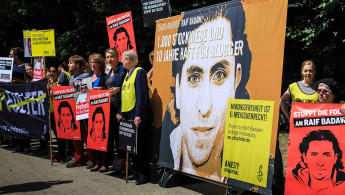Saudi blogger Raif Badawi wins EU Sakharov rights prize
A Saudi blogger sentenced to 10 years in prison and 1,000 lashes for insulting Muslim clerics has won the European Union's prestigious Sakharov Prize for human rights.
Raif Badawi was honoured with the award as a symbol of the fight for freedom of speech — an announcement greeted with a standing ovation Thursday at the European Parliament assembly in Strasbourg, France.
"I urge the king of Saudi Arabia to free him, so he can accept the prize," Parliament President Martin Schulz said.
Schulz described Badawi as "an extremely good man, an exemplary man who has had imposed on him one of the most gruesome penalties that exist in this country, which can only be described as brutal torture."
|
Badawi is serving a 10-year sentence after being convicted of insulting Islam and breaking Saudi Arabia's technology laws with his liberal blog.
He also was sentenced to 1,000 lashes, spread over 20 installments, and fined $266,000. The flogging has been suspended since he received 50 lashes in January, a punishment that sparked international outrage.
Western governments have condemned Badawi's treatment, and rights groups including Amnesty International have campaigned for his release.
The freedom of thought award is named after the Soviet scientist and dissident Andrei Sakharov. It was set up in 1988 to honour people and organisations that are defending human rights and fundamental freedoms.
Badawi was one of three nominees for the prize this year, along with the Venezuelan opposition movement Mesa de la Unidad Democratica and assassinated Russian opposition leader Boris Nemtsov.
"The European Parliament has sent today a strong political and humanitarian message to Saudi Arabian authorities," said Guy Verhofstadt, leader of the Liberal bloc.
"We urge His Majesty King Salman to release Raif Badawi from prison and in any case to end the barbaric punishment of flogging."
In February, the EU parliament voted a resolution calling for Badawi's immediate and unconditional release from jail. They called his flogging a "cruel and shocking act."
Lawmakers see his case as a symbol of the assault on freedom of expression and peaceful dissent.





 Follow the Middle East's top stories in English at The New Arab on Google News
Follow the Middle East's top stories in English at The New Arab on Google News
![Netanyahu furiously denounced the ICC [Getty]](/sites/default/files/styles/image_330x185/public/2024-11/GettyImages-2169352575.jpg?h=199d8c1f&itok=-vRiruf5)
![Both Hamas and the Palestinian Authority welcomed the ICC arrest warrants [Getty]](/sites/default/files/styles/image_330x185/public/2024-11/GettyImages-2178351173.jpg?h=199d8c1f&itok=TV858iVg)
